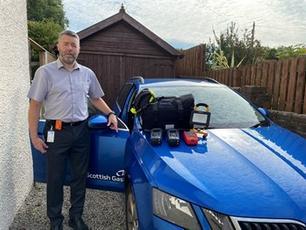Spotlight on Gas Safety: Craig Ross
Gas Safety Week 2021 took place between 13-19 September, so we took the opportunity to speak to some of our members, asking them about their careers to date, their thoughts on gas safety and what the future of gas, and gas safety, looks like to them. IGEM Incorporated Member Craig Ross is a Safety Assurance Engineer at British Gas.

Craig began his career as a British Gas Apprentice Service Engineer (Gas) in August 1988, whereupon he successfully completed his City & Guilds, qualifying as a Service Engineer (Gas) 33 years ago. For the past 24 years, Craig has been a member of the British Gas Technical Support Team.
“From an early stage in my career, I aspired to develop professionally”, he says. “Returning to education, I attained both an ONC and HNC in Mechanical Engineering and a HNC in Management studies. My first promotion came as Technical Support Engineer in May 1999.”
“I have had a long and fulfilling career, working with great colleagues at British Gas and I’ve been particularly fortunate to have had supportive managers, who I thank for their guidance in my career development path in a diverse and challenging role. I have also worked closely with our wider British Gas Operational and Academy teams and with external bodies such as the Health & Safety Executive and Gas Safe, which have all provided invaluable experience.”
In terms of his work, Craig says he particularly enjoys project work – from the early development to the implementation of a process; “this has included improving gas safety in the engineering workforce and the Group Competency Scheme (GCS), an alternative method of recertification from ACS.”
His professional development has continued throughout his career and includes three key qualifications that support his role greatly. The first of which is the Introduction to IOSH Award, which Craig gained as the British Gas Technical Support Team evolved to include Health and Safety. The next is the City & Guilds Assess Candidate Performance D32, which is now referred to as Technical Assessment and Quality Assurance (TAQA) – this involves assessing qualified British Gas engineers as part of the Group Competency Scheme, as well as contractors and newly accredited recruits in British Gas’ support and mentoring process, for both maintenance and installation work.
The third of these key qualifications is the City & Guilds 604301 - Incident Investigation (2008); of which, Craig says “My technical knowledge, understanding and experience gained over the previous 20 years has supported me on many diverse Carbon Monoxide investigations as a British Gas technical expert. Examples of CO incident investigations include unsafe appliances producing CO within a property or migration of CO from an adjoining property to traffic (at peak times) activating CO alarms, and unusual causations such as decayed food in a disused basement. I have also had to investigate a fatality attributed to CO poisoning from a faulty appliance due to lack of servicing.”
On how his role supports safety, Craig says: “As Safety Assurance Engineers we assess and support the engineering team’s correct knowledge on installation, location and operation of Carbon Monoxide Detectors, being the engineer’s first point of contact for support should they attend a confirmed activation of an alarm. Where required we attend site to support should further investigation be required. I have attended the Scottish Parliament supporting the technical lead in the awareness of CO during recent campaigns.”
“Due to Covid restrictions, there has been limited opportunity to run public events as in previous years. However, as an organisation, we are promoting messages of safety through our networks and media channels, internally and externally”, he says. Adding “It is vital that the general public get the key messages on gas safety. As a team, and personally, I am a strong advocate of supporting Gas Safety Week and have been involved in many events in the past.”
So, what does Craig see as the most vital part of gas safety? “It is important that engineers are confident, competent, and consistent in their role. By continually developing their skills, knowledge and experience in an evolving industry, Gas Engineers understand the importance of the work they undertake and its contribution to gas safety.”
“As we move forward, technology is going to evolve with the potential for advanced remote monitoring of appliances to be developed further, including the potential for combustion and gas consumption being added to the current range of remote diagnostic products. For example, the promotion of a recently launched new product due to changes in legislation – offering an alternative CO alarm which is linked wirelessly to the smoke/heat alarms in the property."
Craig initially joined IGEM as an Engineering Technician (EngTech MIGEM) in 2005, following an introduction from member Chris Bielby (FIGEM), and Richard Searle (IEng FIGEM), who is the Gas Technical Lead at British Gas, supported his application to become an Incorporated Member of IGEM in early 2021. Discussing his IGEM membership, Craig says “membership over the years has provided an opportunity to network at events, and an insight into the upcoming changes affecting the gas industry and British Gas. As we move towards the UK Governments recently published Hydrogen Strategy, my membership to the Institution will allow influence within the gas industry, utilising the excellent Hydrogen Knowledge Centre resource.”
“I have always been driven and will continue with further personal development within the industry”, Craig says. Adding that he is currently in the early stages of supporting the Technical Standards Lead in reviewing and critiquing British Gas procedural compliance, and is also developing his knowledge of hydrogen gas as a fuel to support the evolving environmental changes in legislation.
“I recognise and appreciate the level of support I have received throughout my career and firmly believe in helping others: equality for all. I have always been proactive in the support of others who have specific needs both in and out of work”, he concludes.
